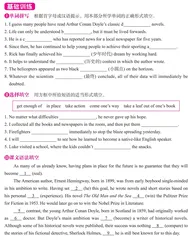Unit 1 Looking forwards

Section Ⅰ Starting out & Understanding ideas
单词拼写 根据首字母或汉语提示,用本部分所学单词的正确形式填空。
1.I guess many people have read Arthur Conan Doyle’s classic d novels.
2.Life can only be understood b , but it must be lived forwards.
3.He is a c who has reported news for a local newspaper for five years.
4.Since then, he has continued to help young people to achieve their sporting a .
5.Rick has finally achieved his (少年时代) dream by working hard.
6.It helps to understand the (历史的) context in which the author wrote.
7.The helicopters appeared as two black (小圆点) on the horizon.
8.Whatever the scientists (最终) conclude, all of their data will immediately be doubted.
选择填空 用方框中所给短语的适当形式填空。
get enough of in place take action come one’s way take a leaf out of one’s book
1. No matter what difficulties , he never gave up his hope.
2. I collected all the books and newspapers in the room, and then put them .
3. Firefighters immediately to stop the blaze spreading yesterday.
4. I will to see how he learned to become a native-like English speaker.
5. Luke visited a school, where the kids couldn’t the snacks.
课文语法填空
As many of us already know, having plans in place for the future is no guarantee that they will become 1 (real).
The American author, Ernest Hemingway, born in 1899, was from early boyhood single-minded in his ambition to write. Having set 2 (he) this goal, he wrote novels and short stories based on his personal 3 (experience). His novel The Old Man and the Sea 4 (win) the Pulitzer Prize for Fiction in 1953. He would later go on to win the Nobel Prize in Literature.
5 contrast, the young Arthur Conan Doyle, born in Scotland in 1859, had originally worked as 6 doctor. But Doyle’s main ambition was 7 (become) a writer of historical novels. Although some of his historical novels were published, their success was nothing 8 (compare) to the stories of his fictional detective, Sherlock Holmes, 9 he is still best known for to this day.
Though both of these men were 10 (ultimate) successful, their paths to success were very different, their futures not necessarily turning out exactly as they planned.
1. 2. 3. 4. 5.
6. 7. 8. 9. 10.
阅读理解
As children, our mother always taught my brother and me the value of acquiring life skills. “It sets you apart and makes you distinguished,” she would say. While my brother chose the path of mastering musical instruments, I was attracted to the field of languages.
Languages fascinated me. I was attracted by the way words gracefully rolled off tongues and how each language seemed to unlock a door to an entirely new world, no matter how challenging they were to learn.
Eager to try beyond Asian languages, it was my mother who suggested French as a suitable starting point. The elegance and poetic charm of the language quickly attracted me. The melodic flow and the way the words effortlessly danced off my tongue caused an exciting feeling, fueling my desire to explore deeper into its complexity. Interestingly, despite my passion and talent for it, French proved to be the language that took the longest to fully grasp. Nevertheless, I insisted and never gave up expanding my linguistic arsenal (宝库).
After realizing that Spanish wasn’t the right match for me, I found myself addicted to the fascinating world of German. Being enrolled (就读) in a German-speaking school accelerated my progress, and two years later, my command of German surpassed (超过) my years of studying French. As time passed, I added Latin, Ancient Greek, and Japanese to my linguistic arsenal.
In fact, speaking multiple languages is not a mere achievement; it is a joyous celebration of the richness of human expression. For me, it serves as a powerful tool to develop connections with people all over the world.
1. What does the author’s mother think of acquiring life skills?
A. It is part of making a living. B. It is a tradition in their family.
C. It makes a person outstanding. D. It contributes to future success.
2. What did the author think of a new language?
A. It broadened her horizon. B. It increased her confidence.
C. It was necessary for her future. D. It was a valuable part of her life.
3. What can we know about the author’s learning French?
A. She quit it halfway. B. She found it challenging.
C. She considered it unsuitable. D. She showed little interest in it.
4. What word can best describe the author?
A. Changeable. B. Independent. C. Creative. D. Determined.
阅读七选五
Psychologists have long believed that human beings have a fairly consistent “negativity bias (偏见)” that leads us to pay more attention to negative thoughts, feelings and events than to positive ones. 1 There is a positive explanation for the question. After all, we are motivated to grow after a misstep. However, we can’t abandon (放纵) ourselves to the negativity bias forever. How? 2